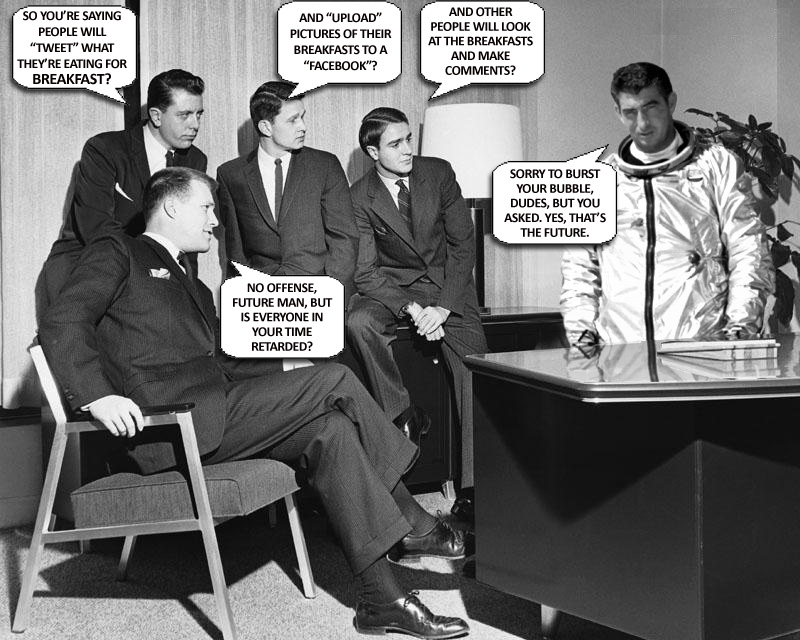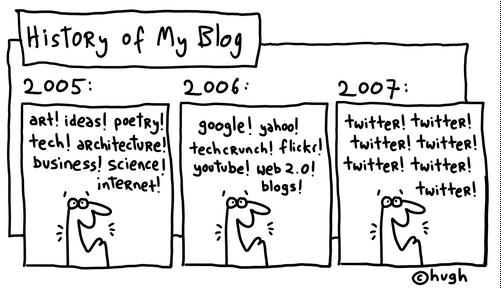
A synopsis/compilation of recent conversations…
Me: Yesterday several of my friends and I went for a hike in the…
Sibling/Friend: …yeah, I read that in your blog.
Me: For our anniversary we went to Disney and…
Sibling/Friend: …I saw your posts and pictures online.
Me: Um, is there anything new I can tell you?
Sibling/Friend: [silence]
I began to wonder if blogging and social media had, in fact, killed conversation, rather than enhancing it.
I had noticed this trend even before I got into Twitter and Facebook. I would call my brother and he would already be up to speed on my life by reading RandomConnections. Now that I’m on Twitter and Facebook, even more people follow my actions.
And it amazes me the people that take interest in the minutiae of my life. I ran into a friend in a store who I don’t see very often, but am friends with on Facebook. His first comment was, “Wow! 19 hours at Disney? I don’t think I could do that!” In the past, that would be something only friends with whom I’ve had regular conversations would know about. It was a good conversation starter, and we chatted for a moment or two.
I was a late adopter for Twitter and Facebook (as can be seen by the years in the cartoon by Hugh McLeod above. Looks like I’m about a year behind the curve.) When I jumped into micro-blogging this past summer I didn’t want it to devolve into life’s minutiae. Granted, I do some of that, but I hope there is more meat in my tweets (gee, that sounds dirty) and Facebook updates. If this ever devolves into complete triviality, I’ll discontinue. I promise.
Even so, I’ve noticed some trends similar to the above. I don’t create blog posts for quick ideas or links like I did in this one from 2003. I save those for Twitter. Twitter’s real power is its mobility. It’s instantly accessible through either my Blackberry or my cell phone. So, it’s great when you come across something cool, but there is no one around to tell about it. I like to think of it as a complement to blogging, not a replacement.
Facebook, on the other hand, is just a big bucket. It catches whatever I post on my blog, Twitter, or Flickr. I only pay attention to it when someone makes a comment on my activities, or when I occasionally comment on my friends. I don’t play games on it, I don’t send fictional gifts to others, and I don’t accept such things for myself.
Someone put it in a recent Tweet like this…
“Facebook is about people you used to know; Twitter is about people you€™d like to know better” (via @Twitter_Tips )
I’ve found that to be the case, too. I won’t make an absolute stranger a friend on Facebook, but I’m more likely to follow them on Twitter. Since I use one application to update both services, it’s possible that in the future I might be introduced to someone and they could say, “Didn’t you spend 19 hours at Disney?” Yeah, it could be creepy, but I also always caution people about sharing TMI.

But back to the original question…
Does social media kill conversation? I don’t think so. I think it redirects conversation. It refocuses it. One of the criticisms of social media is that it’s all driven by narcissism – ” I think that my observations are so important that the entire world should know about it. ” First, don’t underestimate your own observations. You never know who is going to gain some insight or inspiration from them. Secondly, social media can be a way to get all of those “I” statements out of the way so that you can talk about other things. It may be awkward at first, not recounting your recent activities in a conversation, but it could lead to deeper discussions about other things.
Creative social media can be a conversation starter. When I was a teacher I was a big fan of Chris Van Allsburg’s The Mysteries of Harris Burdick. Each page featured one of Van Allsburg’s beautiful illustrations with a title and a single caption. These really caught your attention, and made you wonder what else was going on. I used them frequently as story starters with my students. British Twitterer Nick Warren has managed to do something similar. His Tweets are mini-novels confined to the 140 character limit imposed by Twitter. Here are a few of my favorites…
€œI don€™t smoke€ he sobbed, helpless & confused. The killer smiled at the mistake. €œNonsense€, she said, €œI€™m sure you€™ll smoke beautifully.”
First date. She gave him edited highlights; life, job, cute self-deprecating stories. €œNo€, he said gently. €œTell me who you really are.€
You know the type. His looks put him in the ninety-eighth percentile, his personality put him in the toilet… where I eventually left him.
“Please… it was just a lie, a stupid lie to impress a woman€. But they killed him anyway, on the off-chance he had been telling the truth.
He told himself wild stories about the other commuters, tales of dark passion, violence & comedy. His only fear was that they might be true.
Alone at the graveside, haunted by my father’s final words. “Real men take responsibility, son”, he said. “That’s all you need to know.”
In conclusion, social media can kill a conversation, but only if you let it sink to that level.

Conversation was killed by right wing talk radio. Now they have talking points, angry reactions, and an inability to listen to alternatives that don’t have the names Limbaugh, Hanity, O’Reilley, or the like.
I suppose, on second thought, that it only killed political or public discourse. Falwell, Robertson, Criswell, Jones, et al killed it in religion. What’s left was killed by Twitter and other social networking tools.
This related Pogue post came to my Reader just now: http://www.nytimes.com/2009/01/15/technology/personaltech/15pogue-email.html?partner=permalink&exprod=permalink